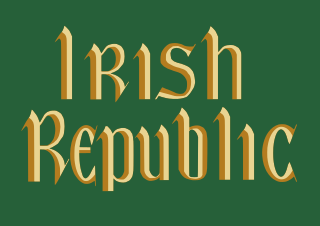
Sinn Féin is an Irish republican and democratic socialist political party in both the Republic of Ireland and Northern Ireland.
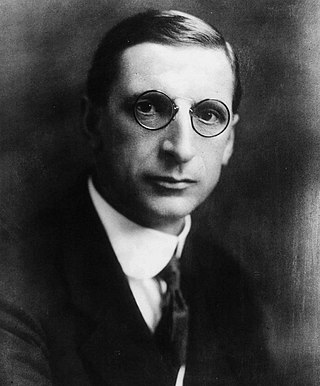
The 1918 Irish general election was the part of the 1918 United Kingdom general election which took place in Ireland. It is a key moment in modern Irish history because it saw the overwhelming defeat of the moderate nationalist Irish Parliamentary Party (IPP), which had dominated the Irish political landscape since the 1880s, and a landslide victory for the radical Sinn Féin party. Sinn Féin had never previously stood in a general election, but had won six seats in by-elections in 1917–18. The party had vowed in its manifesto to establish an independent Irish Republic. In Ulster, however, the Unionist Party was the most successful party.
The Workers' Party is a Marxist–Leninist political party active in both the Republic of Ireland and Northern Ireland.

The 1998 Northern Ireland Assembly election took place on Thursday, 25 June 1998. This was the first election to the new devolved Northern Ireland Assembly. Six members from each of Northern Ireland's eighteen Westminster Parliamentary constituencies were elected by single transferable vote, giving a total of 108 Members of the Legislative Assembly (MLAs).

The 1997 Irish general election to the 28th Dáil was held on Friday, 6 June, following the dissolution of the 27th Dáil on 15 May by President Mary Robinson, on the request of Taoiseach John Bruton. The general election took place in 41 Dáil constituencies throughout Ireland for 166 seats in Dáil Éireann, the house of representatives of the Oireachtas, under a revision in the Electoral (Amendment) Act 1995.

Michelle Gildernew is an Irish Sinn Féin politician from County Tyrone, Northern Ireland. She is the Member of Parliament (MP) for Fermanagh and South Tyrone, having been re-elected in June 2017 after previously holding the seat from 2001 to 2015.

The 1918 United Kingdom general election was called immediately after the Armistice with Germany which ended the First World War, and was held on Saturday, 14 December 1918. The governing coalition, under Prime Minister David Lloyd George, sent letters of endorsement to candidates who supported the coalition government. These were nicknamed "Coalition Coupons", and led to the election being known as the "coupon election". The result was a massive landslide in favour of the coalition, comprising primarily of the Conservatives and Coalition Liberals, with massive losses for Liberals who were not endorsed. Nearly all the Liberal MPs without coupons were defeated, including party leader H. H. Asquith.
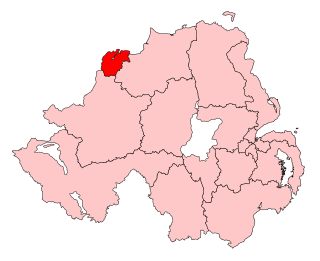
Foyle is a constituency in Northern Ireland represented in the House of Commons of the UK Parliament. Its current Member of Parliament (MP) has been Colum Eastwood of the Social Democratic and Labour Party (SDLP) since 2019.

Fermanagh District Council was a local council in Northern Ireland. It was created out of Fermanagh County Council and later merged with Omagh District Council in April 2015 under local government reorganisation to become Fermanagh and Omagh District Council.

Belfast North is a parliamentary constituency in the United Kingdom House of Commons. The current MP is John Finucane of Sinn Féin.

South Down is a parliamentary constituency in the United Kingdom House of Commons. The current MP for the constituency is Chris Hazzard of Sinn Féin.
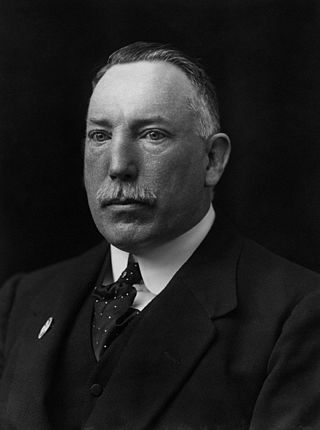
The 1921 Northern Ireland general election was held on Tuesday, 24 May 1921. It was the first election to the Parliament of Northern Ireland. Ulster Unionist Party members won a two-thirds majority of votes cast and more than three-quarters of the seats in the assembly. Sinn Féin in particular was shocked at the scale of the Unionist victory, having spent considerable resources on the campaign, and had expected to win between 1/3 and 1/2 of the seats. Sinn Féin and Nationalist Party candidates were successful in the joint County Tyrone/Fermanagh constituency with 54.71 percent of the vote. The election was conducted using the single transferable vote system.
Sinn Féin is the name of an Irish political party founded in 1905 by Arthur Griffith. It subsequently became a focus for various forms of Irish nationalism, especially Irish republicanism. After the Easter Rising in 1916, it grew in membership, with a reorganisation at its Ard Fheis in 1917. Its split in 1922 in response to the Anglo-Irish Treaty which led to the Irish Civil War and saw the origins of Fianna Fáil and Fine Gael, the two parties which have since dominated Irish politics. Another split in the remaining Sinn Féin organisation in the early years of the Troubles in 1970 led to the Sinn Féin of today, which is a republican, left-wing nationalist and secular party.

Elections were held in January and June 1920 for the various county and district councils of Ireland. The elections were organised by the Dublin Castle administration under the law of the then United Kingdom of Great Britain and Ireland (UK), and held while the Irish War of Independence was pitting UK forces against those of the Irish Republic proclaimed in 1919 by the First Dáil. Elections were held in two stages: borough and urban district councils in January; and county and rural district councils in June. Sinn Féin, which had established the First Dáil, won control of many of the councils, which subsequently broke contact with Dublin Castle's Local Government Board for Ireland and instead recognised the republican Department of Local Government. The election results provide historians with a barometer of public opinion in what would be the last elections administered on an all-island basis: the Government of Ireland Act 1920 passed at the end of the year effected the partition of Ireland from 1921, though the elections for the two home rule Parliaments envisaged by it were held on the same day; No further elections would be held simultaneously across the island of Ireland until 1979, when representatives of the Republic of Ireland and Northern Ireland to the European Parliament were elected. The next local elections were held in 1924 in Northern Ireland and in 1925 in the Irish Free State.
The 1918 East Cavan by-election was a parliamentary by-election held for the United Kingdom House of Commons constituency of East Cavan on 20 June 1918. The election was caused by the death of the sitting member, Samuel Young of the Irish Parliamentary Party.
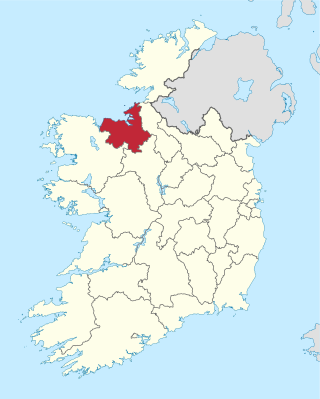
An election to Sligo County Council took place on 4 June 1920 as part of that year's Irish local elections. 20 councillors were elected from 5 electoral divisions by PR-STV voting for a five-year term of office.

The 1920 Dublin Corporation election took place on Thursday 15 January 1920 as part of that year's Irish local elections. 80 councillors to Dublin Corporation were elected from 10 borough electoral areas on the system of proportional representation by means of the single transferable vote (PR-STV) for a five-year term of office.

The 2015 United Kingdom general election in Northern Ireland was held on 7 May 2015 and all 18 seats were contested. 1,236,765 people were eligible to vote, up 67,581 from the 2010 general election. 58.45% of eligible voters turned out, an increase of half a percentage point from the last general election. This election saw the return of Ulster Unionists to the House of Commons, after they targeted 4 seats but secured 2.

The 1922 United Kingdom general election in Northern Ireland was held on 15 November 1922. There were ten constituencies, seven single-seat constituencies with elected by FPTP and three two-seat constituencies with MPs elected by bloc voting. Only two of the constituencies had contested elections.

The 2019 United Kingdom general election was held on 12 December 2019 to elect all 650 members of the House of Commons, including 18 seats in Northern Ireland. 1,293,971 people were eligible to vote, up 51,273 from the 2017 general election. 62.09% of eligible voters turned out, down 3.5 percentage points from the last general election. For the first time in history, nationalist parties won more seats than unionist parties.















